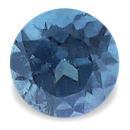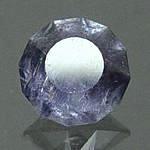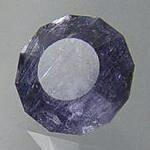|
|
|
|
Click on a letter above to view the list of gems. |
|
|
|
|
|
Cyprine
(Cupreous Vesuvianite) |
|
| Chemistry: Ca19(Al,Mg)13Si18O34(OH,O,F)10 + Cu | |
| Discovered
in 1820 ;
IMA
status: Not Valid. (Vesuvianite is valid; Grandfathered) | ||
|
| ||
|
Classification |
|
|
| |
|
Silicates | |
|
|
8 : Silicates |
|
|
|
|
Crystal Data |
|
|
|
|
|
Vesuvianite: As short pyramidal to long prismatic crystals, to 15 cm, morphologically complex, with up to 30 forms reported on one crystal; columnar, granular, massive. |
|
|
Vesuvianite: Twinned domains observed at a very fine scale. |
|
|
|
|
|
Physical Properties |
|
|
|
|
|
[110] Indistinct, [100] Indistinct, [001] Indistinct |
|
|
Subconchoidal to Irregular |
|
|
Brittle |
|
|
6.5 - 7.0 |
|
|
3.32 - 3.43 (g/cm3) |
|
|
None |
|
|
Not Radioactive |
|
|
|
|
|
Optical Properties |
|
|
|
|
|
Blue, Grayish Blue |
|
|
Transparent to Translucent, Opaque |
|
|
Vitreous to Resinous |
|
|
1.700 - 1.752 Uniaxial ( - ); Uniaxial ( + ) and Biaxial examples are common |
|
|
0.0030 - 0.0060 |
|
|
Relatively Strong |
|
|
Weak |
|
|
|
|
|
Occurances |
|
|
|
|
|
Geological Setting: |
Vesuvianite: In skarns formed during contact or regional metamorphism of limestones; in garnetized gabbros, mafic and ultramafic rocks, and serpentinites; uncommon in alkalic igneous rocks. |
|
Type Locality: |
Kleppan, Sauland, Telemark, Norway |
|
Year Discovered: |
1820 |
|
View mineral photos: | |
|
|
|
|
More Information |
|
|
|
|
|
|
Mindat.org
(Cyprine) |
|
|
|
|
The
only known sources of Cyprine are Kleppan, Sauland, Hjartdal, Telemark, Norway;
Jacoksberg Mine, Nordmark, Filipstad, Sweden; Franklin Mine, Franklin Mining District,
Sussex County, New Jersey, USA and a relatively new find in Pakistan. Only material
from Norway, Sweden and Pakistan are suitable for faceting and
gems are usually small and included. |
|
|
|||||||||||||||||||||||||||


